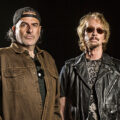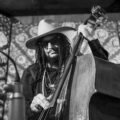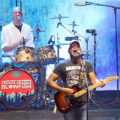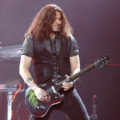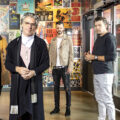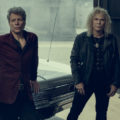Edwin McCain feels “Lucky” following first new album in 15 years, North Shore Center next
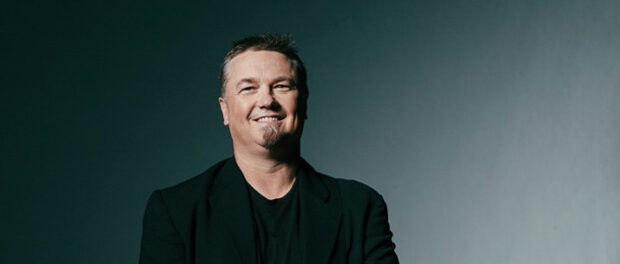 Photos provided by Fisheye Studios and Jennifer Troche Walsh
Photos provided by Fisheye Studios and Jennifer Troche Walsh
Following a 15-year hiatus from original recordings, Edwin McCain finally reclaimed the lane with “Lucky,” a country-infused roots rock comeback that’s just as much a continuation of the hit-making streak he started throughout the 1990s into the 2000s.
The singer/songwriter/guitarist also returns to the road to headline the North Shore Center For Performing Arts in Skokie on Thursday, February 27, which comes after getting warmed up on a record-breaking run supporting college buddies Hootie & The Blowfish and reconnecting with front man Darius Rucker, who originally collaborated together on the smash single “Solitude.”
Chicago Concert Reviews called the “I’ll Be” balladeer for a wide-ranging update, including a few current inspirations, potential reasons for this resurgence, how TikTok fits into the equation and why he “Could Not Ask For More” relating to the entire magic carpet ride thus far.
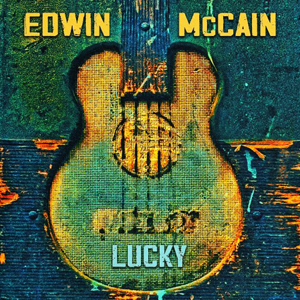 Can you give us a rundown of the last 15 years in between original albums?
Can you give us a rundown of the last 15 years in between original albums?
Edwin McCain: I’ve been home being a dad to my kids and I’ve been out here playing shows. I know the set list they want to hear, so my mindset was always, “Alright, well, I’ve got ten albums. I’ve got all of this music that people like to hear at the shows.” The first rule of show business is “give the people what they want” and I didn’t have a lot of people asking me for new music. I used to joke with my audience. I’d walk on stage and go, “Tonight I’m gonna play nothing but new songs.” And they’d go, “no!” (laughs). So I was kind of content with the fact, and also part of my mindset was sometimes it’s just time to move out of the way. Don’t take up the bandwidth for the new artists that are coming.
Then I think it started in 2012, when I met [country artist] Lee Brice for the first time. He was a really big fan of ours growing up and so he started badgering me about doing a record. I was like, “Nobody wants to hear new stuff from me dude.” And he’s like, “Come on man, let’s do a record.” And I’m like “no” (laughs). He would call me every couple years and try to talk me into it. Then last year he called me and I started to feel like the ‘90s nostalgia was starting to ramp up a little bit. I was like, “man, maybe we should do this” and he was just so excited about doing an album. I had such a great time doing it and I’m honored that he would stay after me about it. I’m really grateful for the way people have responded to it, and in keeping with a time-honored tradition of being wrong, I was wrong. I should’ve done a record sooner (laughs).
What were your inspirations on “Lucky,” both musically and lyrically?
McCain: I arrived with a bunch of sad songs, like I always do, because I’m in the middle path. I’m 55. I’ve lost people. That’s just how it is at this stage of my life, so I very quickly realized, “I just can’t put out these songs. This is too depressing.” So I called Matt Ramsey from Old Dominion. I was like, “Dude, do you have a happy song laying around I could borrow cause I’m in trouble? I got a Prozac record over here and I gotta have some happy songs.” I tried to jettison some of my songs and put in some outside songs just to make a complete record. Our records get all over the place stylistically, so it was fun to get back to that cause this record is pretty much like a lot of our records from a genre standpoint. There’s modern rock elements, there’s jazz, there’s country and then, obviously, a folk singer kind of vibe, so it is all over the place.
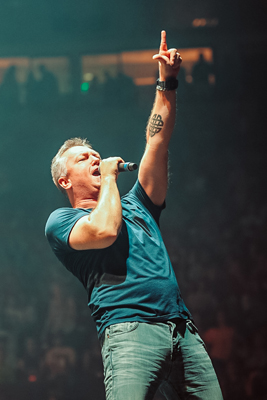 How is the new show shaping up that you’ll be bringing to the North Shore Center?
How is the new show shaping up that you’ll be bringing to the North Shore Center?
McCain: This is the same band I’ve had. Some of the guys have been with me for 35 years, so we’ll cover music from most of the records. I’d say we’ll probably hit songs off eight of eleven albums. It’s interesting too because there were songs from the albums post-Atlantic that became crowd favorites, so it’s cool cause I go through the high points of all the Atlantic records and then get into the independent records. It’s a set list that spans from ’95 to 2025.
Can you recall any prior concerts throughout the Chicago area?
McCain: Yeah, my favorite memories are the two-night stands at the House Of Blues, just such good times. I don’t even know how to quantify it, plus Chicago as a city, and music fans in Chicago, are so great and loyal long term. They’re the best cause here I am 35 years in, and every time we play Chicago, it’s packed. It’s amazing.
Even though you’ve been on the road, what was it like getting back into big time touring with Hootie & The Blowfish and Collective Soul?
McCain: I’d forgotten how much fun those big amphitheater tours are because there’s catering every day, everything works, and it’s all nice and clean. I’ve been in indie world. I drive my own bus, and I change the oil, and the generator and something breaks every day in my world. Out there, it’s all clean showers and clean towels. Ah dude, it’s great. We had the best time.
What was it like starting in the South Carolina scene together?
McCain: We all, and I think all the Hootie guys would say the same, as southeastern bands, no one had any illusions of ever getting a record deal or being part of the bigger music industry, just because bands from our area weren’t in the conversation. The last time anyone had been in the conversation was The Allman Brothers when we were coming up. There were all these touring acts like Johnny Quest, Egypt, the Allgood Music Company, the Aquarium Rescue Unit with Col. Bruce Hampton. It was just van and trailer running up and down, playing in colleges, and in our minds, that was as big as you could get. That was big time to be able to just go play a month of shows with a van and trailer.
Then The Black Crowes kind of blew up, and then Dave Matthews started blowing up and then the Hootie thing started blowing up. Once Dave Matthews signed his deal, the record labels showed up, but the difference is with our bands, we were all supportive of each other. There wasn’t any sense of competition. We were “all for one, one for all.”
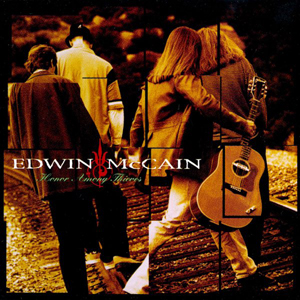 If somebody’s van got crashed, somebody else would loan them a van, or if gear got stolen, they’d help out by borrowing gear. It was very different than what I heard from bands that were from New York or L.A. It was very competitive in those areas, and where we were, it was like, “Hey, let’s all be on the gig together.” I think that was why we were able to do it and then the high concentration of colleges, all the fraternity and sorority gigs that were available to us. It’s really hard to tour out west cause the drives are seven hours. Where we were, I could go to the triangle- Raleigh, Durham and Chapel Hill- and just make laps in the fraternities until we could afford to go to Texas. A lot of it had to do with what was going regionally, but a lot of it had to do with the fact that we all cared about each other too. That was a much more nurturing scene to begin with.
If somebody’s van got crashed, somebody else would loan them a van, or if gear got stolen, they’d help out by borrowing gear. It was very different than what I heard from bands that were from New York or L.A. It was very competitive in those areas, and where we were, it was like, “Hey, let’s all be on the gig together.” I think that was why we were able to do it and then the high concentration of colleges, all the fraternity and sorority gigs that were available to us. It’s really hard to tour out west cause the drives are seven hours. Where we were, I could go to the triangle- Raleigh, Durham and Chapel Hill- and just make laps in the fraternities until we could afford to go to Texas. A lot of it had to do with what was going regionally, but a lot of it had to do with the fact that we all cared about each other too. That was a much more nurturing scene to begin with.
One of your earliest major songs was “Solitude,” which featured Hootie’s front man Darius Rucker. How did that help introduce you to the world?
McCain: Darius fell in love with that song when we were in college, and then when they got their record deal, they talked Atlantic into signing me too on the promise that he would appear on the single with me, so it did everything. It was the reason I got a record deal, and then to this day, it’s a song people ask for. Songs are kind of like magic carpets. They take you on a trip. That one got me off the ground for sure.
Tell us everything that “I’ll Be” has brought to your life.
McCain: That song is like a big Russian icebreaker that just keeps plowing. Doesn’t matter what happened, what gets in front of it, it’s just gonna chug right through. Now it’s 30 years later and I see these reports on it. It just keeps on churning, it’s crazy. It’s a one-in-a-billion [chance] that you get a song that does that, becomes an gold, recurrent standard kind of song. It’s carried us all these years, because even when I go to places I’ve never played before, everybody knows that song, even if they don’t know it’s me. They’ll go, “that guy that sings that song is playing over at the so and so,” and that way I end up with 500 to 600 in a bar I’ve never played at before. It’s been the key to every city I guess you’d say.
You mentioned this usually happening only once, but it’s actually occurred multiple times for you. What about “I Could Not Ask For More”?
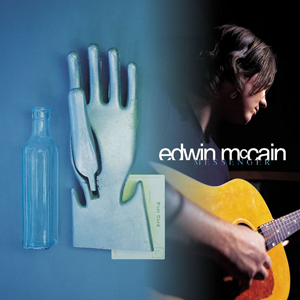 McCain: I didn’t write that song, and if I’m being honest, I didn’t want to record that song. I didn’t know who [writer] Diane Warren was because 27-year-old me was busy listening to Bob Mould and weird music that nobody knows. When I first heard the song I was like, “I don’t really want to do this song.” First of all, it wasn’t mine and I just wasn’t really into it. I didn’t know any better, so Atlantic just kind of paid me to record it and they put it on a soundtrack, [“Message In A Bottle”]. Then they got it on the air and it started taking off. They’re like, “Oh guess what? You’re actually gonna put this on your album, [‘Messenger’].” I was like, “ah, okay. Yeah, you’re right” (laughs). I can’t take any credit in any way for that because I was an unwilling participant. I’ll say this, I’m grateful as hell that I did it cause it worked out pretty good and it also worked out really good for Sara Evans. Again, continuing my long-standing tradition of being wrong a lot of the times.
McCain: I didn’t write that song, and if I’m being honest, I didn’t want to record that song. I didn’t know who [writer] Diane Warren was because 27-year-old me was busy listening to Bob Mould and weird music that nobody knows. When I first heard the song I was like, “I don’t really want to do this song.” First of all, it wasn’t mine and I just wasn’t really into it. I didn’t know any better, so Atlantic just kind of paid me to record it and they put it on a soundtrack, [“Message In A Bottle”]. Then they got it on the air and it started taking off. They’re like, “Oh guess what? You’re actually gonna put this on your album, [‘Messenger’].” I was like, “ah, okay. Yeah, you’re right” (laughs). I can’t take any credit in any way for that because I was an unwilling participant. I’ll say this, I’m grateful as hell that I did it cause it worked out pretty good and it also worked out really good for Sara Evans. Again, continuing my long-standing tradition of being wrong a lot of the times.
Did having such iconic ballads ever limit you or cause people to have certain expectations?
McCain: Okay, so my favorite thing that happens now is meeting the reluctant husband. Their wife dragged them to the show and all the husband knows is these ballads, right? I’ll have these guys come up to me after the show and go, “I feel like I need to say something to you. I feel kinda guilty cause all week long I was dreading this. I knew she was dragging me out to this stupid show and I told everybody at work. I was like, ‘I can’t believe I gotta go listen to this guy,’ but man, you were really good” (laughs). He’s literally been dreading having to go see some balladeer, and then they come to our show and that’s part of it, but that’s not the whole thing. It’s actually worked in my favor because I think sometimes people will come with a lot of expectations and they leave understanding that it’s a lot different than that.
Why do you think music from the ‘90s is experiencing such a resurgence nowadays?
McCain: I think there is a lot of nostalgia for the ‘90s because it was pretty fun and I think it was, mercifully, before camera phones and before smart phones had us all staring into the abyss all the time. Back then, you didn’t know the things you don’t know and now everybody knows a lot more than they need to. I think people are starting to feel nostalgic towards a more innocent mindset where we’re just having fun and doing our thing. I think that’s why, but also the music from that era. You think about bands like Rage Against The Machine, Tori Amos…and then The Smashing Pumpkins. There was a lot of eclectic music out there and that was when Ice Cube and N.W.A. [really took off]…I would say it really was a lot more diverse than it is now.
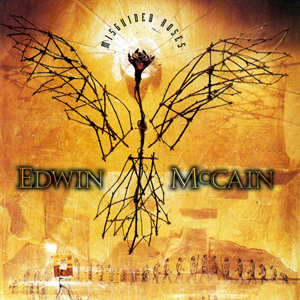 What about a few of the favorite places you’ve appeared in pop culture as of late?
What about a few of the favorite places you’ve appeared in pop culture as of late?
McCain: It’s crazy. I was in the “New York Times” crossword puzzle. My phone blew up that morning and I was like, “What is going on?” People texting me, “Bro, you’re in the ‘New York Times’ crossword puzzle!” I was like, “You know, I think my work here is done.”
And then I sang the national anthem for the AFC [American Football Conference] championship game for the [New England] Patriots and I was wearing a Patriots jersey. Snoop Dogg is a Pittsburgh [Steelers] fan and that’s who they were playing, so he got really pissed off that I was wearing a Patriots jersey and he posted this post ranting about, “Who the hell is this miniature Alec Baldwin-looking mother f***er singing the national anthem?” I follow him, so it showed up in my feed and I was dying. Now every time I think I’m having a bad day, I just pull that video up with Snoop going off about me singing the anthem in a Patriots jersey and it just makes me happy. I think I might have peaked at that moment as far as being part of pop culture, but I’ll take it. That was hilarious.
Where does TikTok fit into the timeline?
McCain: I completely shunned social media like a lot of Gen Xers. I just refused to participate forever. The girls that were in the management office were like, “Look man, you have to participate. This is the only way people know anything anymore.” I was like, “Well, then never. I’m not doing it: ha, ha, ha. Get out of my yard.” Then COVID hit and everybody was bored in the house. A friend of mine was like, “Dude, you gotta download TikTok.” I’m as ADD as they come. TikTok is like pure heroin for the ADD crowd. I love all the good stuff about it, where you get to hear all these different perspectives from all these different people if you’re just willing to listen for a second.
The most important thing is that you just be your authentic self. Don’t have any pretense and don’t try to sell anything, just be yourself. I love that because that’s not the way the music business was in ’96 or ’97. They wanted to build rock stars, and build a mystery, and make you look cooler than you are and I always hated that. I always felt that was weird and now you can just completely be yourself.
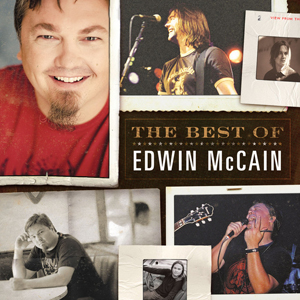 Like look at Jelly Roll. Here’s this dude, you know what I mean? It’s all these people being just warts and all, letting it all hang out and I was like, “I’m here for this one hundred percent.” So I got in the mix with it and I was surprised to see all these people were like,“Holy crap, he’s alive!” Cause as far as the general public goes, I was in the Witness Protection Program. The last time they had seen me was in a video in ’97, so it was sort of like a Lazarus moment. “I’m alive” (laughs). And the comments section is my favorite place to be, not just my videos, any video, because I am so thrilled to realize how many funny people there are on the planet and just some of the ridiculous stuff people say, comments that I see that make me cry laughing.
Like look at Jelly Roll. Here’s this dude, you know what I mean? It’s all these people being just warts and all, letting it all hang out and I was like, “I’m here for this one hundred percent.” So I got in the mix with it and I was surprised to see all these people were like,“Holy crap, he’s alive!” Cause as far as the general public goes, I was in the Witness Protection Program. The last time they had seen me was in a video in ’97, so it was sort of like a Lazarus moment. “I’m alive” (laughs). And the comments section is my favorite place to be, not just my videos, any video, because I am so thrilled to realize how many funny people there are on the planet and just some of the ridiculous stuff people say, comments that I see that make me cry laughing.
Do you consider this period of your career to be a comeback or a continuation?
McCain: I’ve been joking around like it’s a comeback, but I haven’t really gone anywhere. I’ve been playing shows this whole time, but I haven’t been in the larger conversation at all, so I guess it’s a comeback-uation? That’s what I’m gonna call it. The thing I love about this part of my career, like I was playing this really quiet, seated theater. As we were walking out, it was dead silent, and I heard this woman turn to her husband and go, “He looks okay. He looks okay” (laughs). I was like, “This is awesome. I’m getting credit for just waddling out here.” Man, it used to be the bar was set so high. [Now] I’m getting credit for being bipedal.
It’s been a lot of fun too because I think a lot of times people go to a show and they go, “well, I’ve seen that,” and then they don’t go to that show for another ten years. Like this last summer, there were a lot of people that hadn’t seen us in 20-something years. It was interesting to see a lot of people [came] just to see if I’m still ambulatory, but I never looked at it like that because I was out there playing my little 500 to a thousand-seat room gigs. Those people know, so I just assumed everybody knows, but that’s not how it works. There’s a portion of the general public that does not pay attention to anything unless it’s really out front, you know? Unless it’s really out there and in the mainstream, it’s like it doesn’t exist. So for all those years, I kind of just didn’t exist, even though I was out there playing shows, making a good living, out there doing my thing. It’s really been fun to be back. All of a sudden, I’m back in my old job again. Here I am!
Edwin McCain performs at the North Shore Center For Performing Arts on Thursday, February 27. For additional details, visit Edwin.com and NorthShoreCenter.org.

